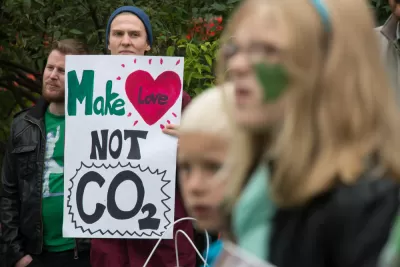The U.S. is exceptional when it comes to carbon emissions—that much is indisputable.

Umair Irfan boosts the signal on a report published in April by Carbon Brief, which calculated the cumulative carbon emissions of every country since 1750.
"What’s abundantly clear," according to Irfan's explanation of the Carbon Brief's analysis, "is that the United States of America is the all-time biggest, baddest greenhouse gas emitter on the planet."
The Carbon Brief team also created a graph that tracks each country's carbon output since 1750.
Animation: The countries with the largest cumulative CO2 emissions since 1750
Ranking as of the start of 2019:
1) US – 397GtCO2
2) CN – 214Gt
3) fmr USSR – 180
4) DE – 90
5) UK – 77
6) JP – 58
7) IN – 51
8) FR – 37
9) CA – 32
10) PL – 27 pic.twitter.com/cKRNKO4O0b— Carbon Brief (@CarbonBrief) April 23, 2019
For more topical assessment of the world's current carbon emissions, see the "Global Carbon Budget" released this week by the Global Carbon Project, which finds the world's carbon emissions reaching a new high in 2019. The United Nations also last week released a report pinning much of the blame for climate change on the 20th century history of land use and transportation planning in the United States.
FULL STORY: Why the US bears the most responsibility for climate change, in one chart

Americans May Be Stuck — But Why?
Americans are moving a lot less than they once did, and that is a problem. While Yoni Applebaum, in his highly-publicized article Stuck, gets the reasons badly wrong, it's still important to ask: why are we moving so much less than before?

Using Old Oil and Gas Wells for Green Energy Storage
Penn State researchers have found that repurposing abandoned oil and gas wells for geothermal-assisted compressed-air energy storage can boost efficiency, reduce environmental risks, and support clean energy and job transitions.

Placekeeping: Setting a New Precedent for City Planners
How a preservation-based approach to redevelopment and urban design can prevent displacement and honor legacy communities.

Study: Maui’s Plan to Convert Vacation Rentals to Long-Term Housing Could Cause Nearly $1 Billion Economic Loss
The plan would reduce visitor accommodation by 25,% resulting in 1,900 jobs lost.

Idaho Data: Unexpected Vehicle Repairs Exacerbate Housing Instability, Eviction Risk
Over 21 percent of clients struggle with transportation barriers.

A Year-Long Investigation On Permanent Supportive Housing
The New York Times reveals what’s working and what’s not in the cornerstone of Housing First.
Urban Design for Planners 1: Software Tools
This six-course series explores essential urban design concepts using open source software and equips planners with the tools they need to participate fully in the urban design process.
Planning for Universal Design
Learn the tools for implementing Universal Design in planning regulations.
Heyer Gruel & Associates PA
City of Moreno Valley
Institute for Housing and Urban Development Studies (IHS)
City of Grandview
Harvard GSD Executive Education
Salt Lake City
NYU Wagner Graduate School of Public Service
City of Cambridge, Maryland




























